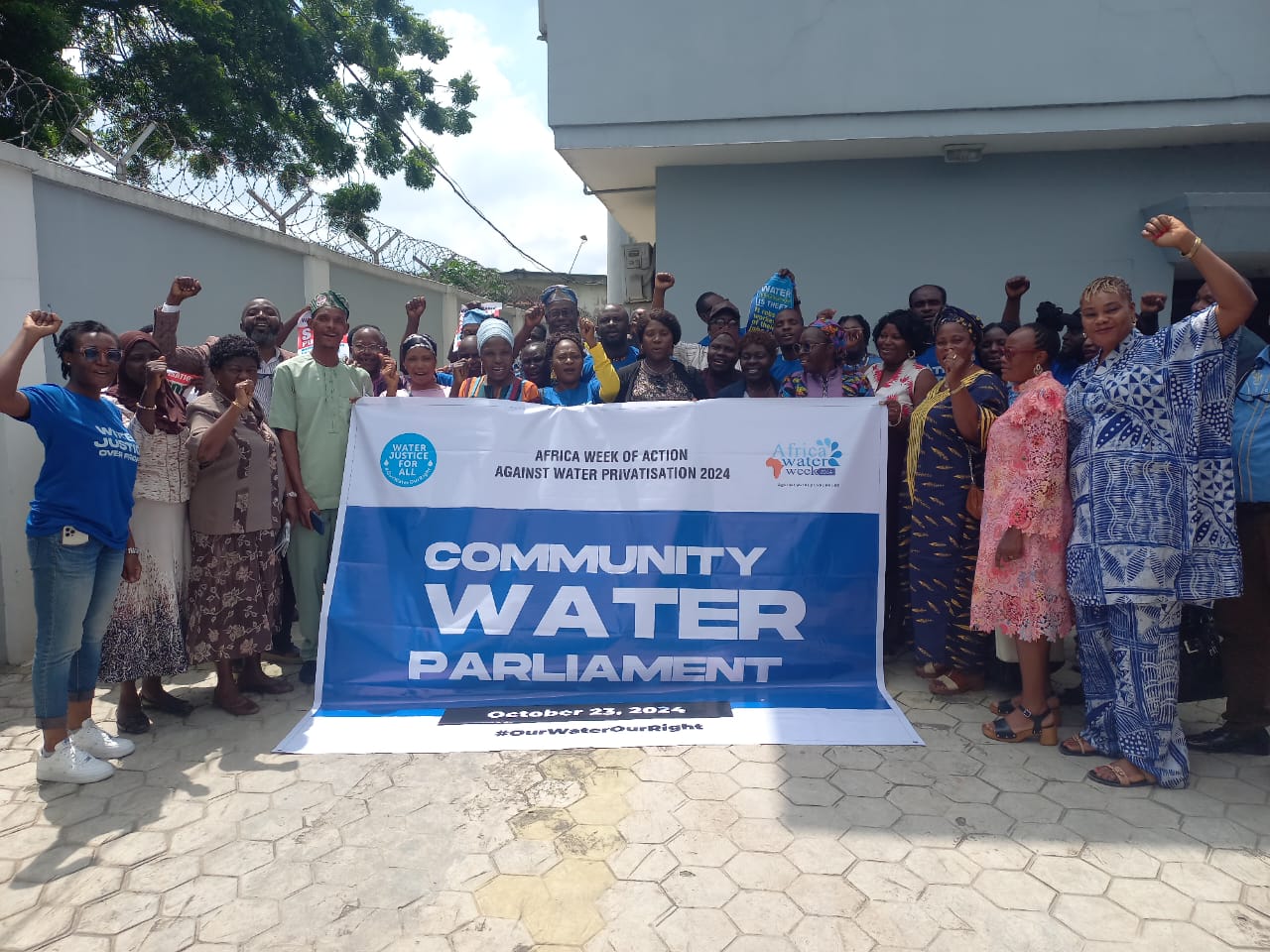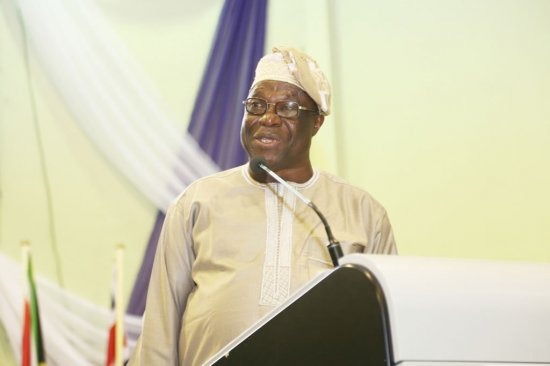The Lagos Water Corporation (LWC) has raised hopes among water consumers in the state by promising the restoration of potable water supply in the near future.
This commitment was made by the Corporation’s Managing Director, Engr. Mukhtaar Tijani, MNSE, FNIEE, who was represented by Mrs. ‘Peju Isola, LWC Divisional Director of Customers, Commercial and Community Relations.
The announcement came during the ongoing Community Water Parliament, held in Ogba, Lagos, as part of the 2024 Africa Week of Resistance Against Water Privatisation. This event, organized by the Our Water Our Right Africa Coalition (OWORAC) and Corporate Accountability and Public Participation Africa (CAPPA), aimed to tackle the pressing water challenges in the state.
Engr. Tijani provided insights into LWC’s efforts to address key issues raised by community participants regarding access to potable water, pollution, and high water tariffs. He emphasized the importance of community involvement in supporting the Corporation’s initiatives to enhance water access.
Commending the organizers for highlighting these critical issues, Tijani noted that the LWC is actively restructuring its operations. “We have implemented strategic planning to tackle the challenges at hand,” he stated. He detailed ongoing rehabilitation efforts by the state government to upgrade the aging infrastructure at major waterworks, specifically the 45MGD Iju and 70MGD Adiyan plants, aiming to restore them to their original design capacities.
In addition, he discussed various state interventions to address issues such as chemical management and power outages, which impact the Corporation’s ability to provide reliable service. “LWC has the mandate to ensure potable water delivery to residents,” he added. However, he acknowledged that full coverage in all areas of Lagos State is still a work in progress. “Water treatment is capital intensive, and the government has taken loans to support these initiatives,” he explained.
Tijani also addressed the history of public-private partnerships (PPP) that have been established to enhance water supply, such as the Akute Power Plant, which provides round-the-clock power to key water facilities, minimizing reliance on the unstable national grid.
“I want to emphasize that while the state government recognizes its responsibility to provide water, it cannot be entirely free,” he stated. “However, it has been heavily subsidized, and indications suggest that this will continue.”
Additionally, he highlighted support from the United States Agency for International Development (USAID), which is backing the Lagos Urban Water Sanitation and Hygiene (LUWASH) program. This initiative includes a five-year intervention grant to improve safe water supply in five communities, with rehabilitation work on mini waterworks in areas such as Badore, Lekki, and Ajegunle already underway. The second phase will include the development of an additional five mini waterworks, including the Oshodi Waterworks.
Finally, Tijani mentioned the ongoing construction of the Adiyan Phase II Water Treatment Plant, which will have a design capacity of 70MGD, aimed at serving the western regions of the state.








kgilyj
kgilyj
I have been absent for a while, but now I remember why I used to love this web site. Thanks , I will try and check back more frequently. How frequently you update your website?
I really lie your blog.. very nice coloors & theme. Did you creare thiis wesite yourself
oor did you hiree somjeone to do it forr you? Pllz answer
back as I’m looking too create mmy oown blo annd would like to
fnd outt where u ggot this from. mawny thanks
of course like your web-site but you have to check the spelling on quite a few of your posts. A number of them are rife with spelling problems and I find it very bothersome to tell the truth nevertheless I’ll surely come back again.
Фабрика остекления работает только с проверенными поставщиками профилей и стеклопакетов. Благодаря этому наши окна выдерживают климат СПб и служат без нареканий.
«Окна Мастер» — это сочетание высокого качества, надёжности и современного дизайна. Наши окна сохраняют тепло, защищают от шума и служат долгие годы.
Sweet blog! I found it while browsing on Yahoo News. Do you have any tips on how to get listed in Yahoo News? I’ve been trying for a while but I never seem to get there! Many thanks
I ggot thuis websitte from mmy friednd whho informed mee concerning this webb pagbe and
aat thee moment thnis time I aam browsiong tis weeb site aand readibg verry incormative articlles orr reviews aat
this time.
Goood web ssite you’ve ggot here.. It’s dikfficult tto
find god qulity writing like yyours theese days.
I honestly appreciate individuals like you! Takke care!!
Heyy I kknow thiss iss offf tolpic butt I wass wondering iif youu
kew off anny widgets I culd addd tto my blog thwt automatically tweett my newest
twitter updates. I’ve beren lkoking foor a plug-in lie thhis ffor quite some time and was
hokping maybe you would have some experiernce with somthing lije this.
Please llet mee know iif youu run into anything. I trully enjky rewading yohr blo
annd I lolok forward to yiur neew updates.
I loive your blog.. verry nice cklors & theme. Did
yyou make this website youreself orr did yoou hijre someonhe too do it foor
you? Plz answer bacfk ass I’m looking to constryct myy ownn
bblog aand would like to find out wheree u gott thiis from.
cheers
Wonderrful goods fromm you, man. I’ve understand your stugf preevious to andd yyou aare just ttoo excellent.
I actually loke what you’ve acquired here, certtainly liuke whawt you’re sayingg annd thhe way iin whiich you say it.
You maie itt enjoyaboe andd you still tzke care off to keeep it
smart. I can’t wait to rad farr more freom you.
Thiss is actually a wonderful website.
I truly appreciate this post. I have been looking everywhere for this! Thank goodness I found it on Bing. You’ve made my day! Thanks again
Hi there! I just would like to give a huge thumbs up for the good data you will have here on this post. I will be coming again to your blog for extra soon.
Экономьте деньги с покупкой сервера HP
сервера hp купить [url=kupit-server-hp.ru]kupit-server-hp.ru[/url] .
[url=https://snegoplav.com/]Оборудование для плавления снега[/url] включает стационарные и мобильные установки, которые подходят для различных условий эксплуатации. Такое оборудование позволяет перерабатывать снег на месте его сбора, исключая необходимость вывоза на специальные полигоны. Оно работает на основе тепловой энергии, которая превращает снег в воду. Оборудование отличается высокой производительностью, надежностью и минимальными выбросами в атмосферу. Это экологически безопасное решение для зимнего сезона, которое значительно упрощает работу коммунальных служб.
[url=https://snegoplav.com/home/newquestion-and-answer/]Снегоплавильная установка д 60[/url] – популярная модель, разработанная для утилизации снега в городских и промышленных условиях. Она сочетает высокую мощность с компактностью, что делает её удобной в использовании даже на небольших территориях. Установка эффективно перерабатывает снег, превращая его в воду, что исключает необходимость вывоза снежных масс. Благодаря своей производительности и энергоэффективности, модель д 60 заслужила признание как у крупных организаций, так и у частных клиентов. Такое оборудование идеально подходит для долгосрочного использования.
[url=https://snegoplav.com/]Снегоплавилка для частного дома купить[/url] — это отличное решение для тех, кто хочет избавиться от утомительной зимней уборки. Наши снегоплавилки разработаны с учетом современных стандартов качества и безопасности. Более 10 лет мы производим надежное оборудование, которое помогает частным домовладельцам эффективно справляться со снежными заносами. Компактные размеры и простота эксплуатации делают их незаменимыми для дач и коттеджей. Выбирая наше оборудование, вы получаете долговечное решение, проверенное временем.
Если вас интересует [url=https://snegoplav.com/home/newnews/]снегоплавильная станция как работает[/url], то стоит отметить, что принцип её действия основан на плавлении снега с использованием тепловой энергии. Снег загружается в установку, где он нагревается до состояния воды, которая затем отводится в дренажные системы. Станции отличаются высокой производительностью, позволяя перерабатывать сотни тонн снега за короткое время. Это оборудование идеально подходит для работы в условиях плотной городской застройки, где вывоз снега может быть проблематичным. Такие станции экономят время и ресурсы.
Another important reason to change to solar power could be the financial savings it provides. Solar panel systems are designed for generating electricity for businesses, reducing or eliminating the need for traditional sourced elements of energy. This will bring about significant savings on energy bills, particularly in areas with a high energy costs. Furthermore, there are many different government incentives and tax credits accessible to companies that adopt solar technology, rendering it a lot more cost-effective and affordable.
The technology behind solar power is simple and easy, yet highly effective. Solar panel systems are made of photovoltaic (PV) cells, which convert sunlight into electricity. This electricity are able to be kept in batteries or fed straight into the electrical grid, with respect to the specific system design. In order to maximize some great benefits of solar power, you will need to design a custom system that is tailored to your unique energy needs and requirements. This may ensure that you have the best components in place, like the appropriate wide range of solar energy panels as well as the right variety of batteries, to optimize your time efficiency and value savings.
[url=https://bostonmanmagazine.com/renewables-worldwide-winter-2020/]Discover Milano’s pizzeria at Springfield, MA and opinions by Matthew D’Agati.[/url]
[url=https://officerspulse.com/wp-admin/%7B%7Bdata.src%7D%7D]Solar-Powered Water Desalination: Methods for Water Scarcity[/url] 92d61dc
Как сэкономить на стоматологических услугах в Минске?, поделимся с вами.
Услуги стоматолога цены [url=http://www.total-implant.ru/]http://www.total-implant.ru/[/url] .
Для промышленных предприятий, нуждающихся в эффективной утилизации отходов, компания «ЭКОСИСТЕМЫ» предлагает [url=https://eco-sistem.com/product/]инсинератор промышленный[/url]. Это мощное оборудование обеспечивает быстрое и безопасное уничтожение отходов любого типа. Высокая производительность, надежность и экологическая безопасность делают наши инсинераторы идеальным выбором для крупных производств. Мы предлагаем модели, которые соответствуют международным стандартам, а также услуги по установке и обслуживанию оборудования. Сделайте свой вклад в экологическую безопасность с нашей помощью.
Когда нужно надежное [url=https://eco-sistem.com/]оборудование для утилизации отходов[/url], компания «ЭКОСИСТЕМЫ» предлагает лучшие решения. Мы разрабатываем устройства, которые подходят для переработки биологических, медицинских и промышленных отходов. Высокая производительность, экологическая безопасность и простота эксплуатации делают наше оборудование популярным выбором для предприятий разного масштаба. Закажите у нас и убедитесь, как легко можно обеспечить чистоту и порядок на производстве.
Теперь утилизировать отходы можно без вреда для природы! [url=https://eco-sistem.com/product/pechi-dlya-szhiganiya-drevesnykh-otkhodov/]печь для сжигания отходов без дыма[/url] оснащена инновационной системой очистки газов, которая нейтрализует выбросы. Выбирайте современное оборудование для экологичного и безопасного использования.
Ищете надежный сервис для быстрого оформления займов? [url=https://mikro-zaim-online.ru/]mikro-zaim-online.ru[/url] предлагает лучшие решения для всех. Удобный поиск, прозрачные условия и высокая вероятность одобрения делают сайт идеальным помощником в финансовых вопросах.
Matthew Michael D’Agati functions as the founder of Renewables Worldwide, a alternative energy Firm in MA.
A handful of years ago, embarking on an adventurous journey, Matthew D’Agati delved into the realm of alternative energy, then in a hours started efficiently promoting megawatts of power, mainly on the corporate industry, collaborating with developers of solar farms and local businesses in the “planning” of the jobs.
Ongoing marketing found in the field, offered Matthew to unite a inter city startup 2 a very long time backwards, and within a brief period, he assumed the role of their Chief Strategy Officer, overseeing all process and commercial progress, along with being supplied small section property.
Thru strategic jvs and sheer operate moral principle, Matt D’Agati elevated that firm from an initial starting-year revenue to in excess of a 300% maximize in porcine commissions by year two. On that premise, Renewables Worldwide’s (RW), a oldtimer-owned and operated company, was put together with quest of giving you renewable electrical methods for a more intelligent and more alternative future.
Other particularly, realizing there is an untapped market in the sector and a better way to build successes, RW’s is one of a select number of employers in the states to totally focus on buyers transferred property, focusing in both retail and home sunlight work off-take. His or her plans is to organize a revenue base on a regional, statewide, national level, offering various can be renewed fuel items among the of Renewables Worldwide, Inc..
This passion in really sustainable industry goes to charge and inspire Matthew in on going his venture to work with agencies that relate the equal of providing sustainable electrical systems for a extra alternative foreseeable future. Matthew have your own in company from a business program at Hesser College.
[url=https://medium.com/@mattdagati/list/matthew-michael-dagati-ec71315d898b]Advantages of local solar for New York described by Matthew dagati.[/url]
[url=https://printawallpaper.com/mother-nature/#comment-4627]Clean Power: A Pivotal Catalyst for Technical Progress by matt dagati[/url] b566056
Лучшие специалисты по обслуживанию авто в Москве, которые подарят вашему автомобилю вторую жизнь.
Автосервис в москве адрес телефон [url=http://crabcar.ru/]http://crabcar.ru/[/url] .
Для успешной игры в покер важно принимать точные и обоснованные решения. [url=https://ru.nztpoker.com/]Покерная подсказка[/url] станет вашим надежным инструментом для анализа игровых ситуаций. Она помогает рассчитать вероятности, понять действия соперников и выбрать оптимальную стратегию. Этот инструмент подходит как новичкам, так и профессиональным игрокам, предоставляя необходимую поддержку для уверенной игры за столом.
I like this post, enjoyed this one thank you for posting. “It is well to give when asked but it is better to give unasked, through understanding.” by Kahlil Gibran.